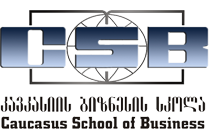This code corresponds to the Law of Georgia on Higher Education, charter of Caucasus University and other normative documents of Caucasus University and Caucasus School of Business.
This code of ethical conduct represents the inter-shared and acknowledged statements of Caucasus School of Business and different associated groups, which determine their ethical actions.
1. Code of ethics is applied to every group of people who represent stakeholders of Caucasus School of Business. These include:
• Permanent or visiting faculty of Caucasus School of Business
• Undergraduate, graduate and doctoral students
• Administrative and supporting staff and other individuals who act on behalf or/and who perform services for CSB
2. Principles of Ethical Conduct
- Respect of others – Caucasus School of Business is the workplace and educational environment for different people. We value diversity and respect individual differences. CSB does not tolerate any act of discrimination or harassment on the grounds of age, disability, gender, marriage, pregnancy and maternity, race, color, nationality, ethnical belonging, religion and sexual orientation. CSB follows protection of fundamental human rights based on FREDA principle (Fairness, Respect, Equality, Dignity and Autonomy).
- Compliance with applicable laws, rules, regulations and university policies – every person who has affiliation with CSB has to obey applicable Georgian or any country's law in which CSB does business
- Individual Responsibility and Accountability practices, which envisages responsible conduct of its faculty – CSB trusts professional and personal integrity of its staff; it provides appropriate academic and research facilities meeting international standards. CSB operates on principles of ethics which is to be obeyed during the learning and research process.
- Avoidance of conflict of interest – Administration and academic staff shall not participate in commercial activities in other commercial activities of any kind. This is classified as a conflict of interest and must be prohibited instantly. If and when any such conflict arises, administration shall immediately be informed.
- Confidentiality – confidential information shall not be disclosed, unless authorized for disclosure by an appropriate department of the University or/and by law. Confidential information includes private data of students, faculty and personnel; non-public information belonging to CSB that might be used by competitors; non-public information/knowledge which is produced/generated at CSB.
- Sustainability and the Appropriate Use of Resources – CSB recognizes its responsibility to ensure the learning process is conducted with its material resources and students and academic staff are provided with any appropriate techniques and educational supplies. They have access to information and communication technologies as well as to the library resources.
3. In the case of violation of any of the principles or the articles of the Code of Ethics of the Caucasus School of Business or of the Regulations on Student's/Professor's Status, any person (a student, academic personnel or a staff member) is entitled to address in writing to the Monitoring or Legal Department of the Caucasus University with a report describing the fact of violation.

